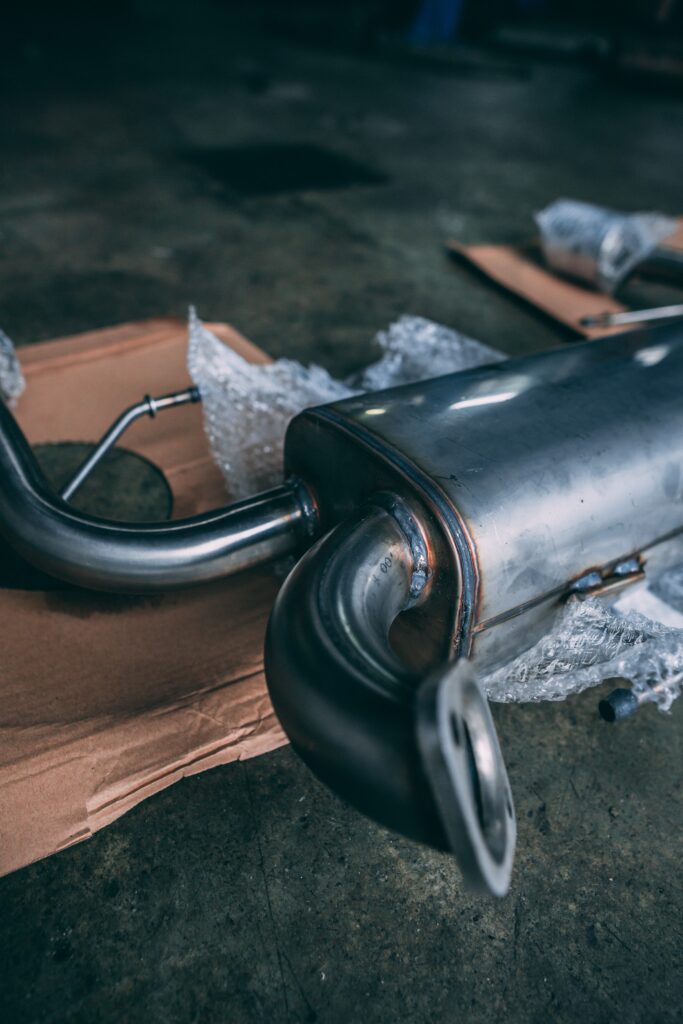Imagine this scenario: you start your car in the morning, ready to head out for the day, but as you sit behind the wheel, you notice a rough shaking and uneven sounds coming from your engine. You wonder, could it be a bad exhaust causing this rough idling? In this article, we will explore the possibility of a bad exhaust system being the culprit behind your car’s rough idling, and delve into the potential implications it can have on your vehicle’s overall performance. So, let’s dive in and find out if your exhaust is to blame for that unsettling shake.

Understanding Exhaust System and Engine Idling
The role of the exhaust system in a vehicle
The exhaust system plays a crucial role in the overall function of a vehicle. Its main purpose is to safely remove the harmful gases produced by the combustion process and dispose of them outside the vehicle. This system consists of various components, including the exhaust manifold, muffler, catalytic converter, and oxygen sensors, all working together to ensure the smooth operation of the engine.
What is engine idling?
Engine idling refers to the running of an engine when the vehicle is stationary or not in motion. While idling may seem harmless, it actually has a significant impact on the overall performance of the vehicle. During idling, the engine continues to operate, albeit at a lower speed, to maintain power for essential functions such as powering the electrical systems and running the air conditioning.
Connection between the exhaust system and engine idling
The exhaust system and engine idling are closely connected. The exhaust system’s main function is to remove the gases produced during combustion, including carbon monoxide, hydrocarbons, and nitrogen oxides. When the exhaust system is in good condition, it efficiently transports these gases away from the engine and out of the vehicle. However, if the exhaust system is faulty or damaged, it can lead to rough idling due to various reasons, including inaccurate sensor readings, impaired exhaust gas recirculation, and issues in the air-fuel mixture.
Possible Effects of a Bad Exhaust System
Decreased engine performance
One of the primary effects of a bad exhaust system is decreased engine performance. A faulty exhaust system can restrict the flow of exhaust gases, leading to increased backpressure in the engine. This increased backpressure can result in reduced power and performance, making it difficult for the engine to operate at its optimal level.
Increased emissions
A bad exhaust system can also lead to increased emissions. As mentioned earlier, the exhaust system is responsible for safely disposing of harmful gases produced during the combustion process. When the exhaust system is damaged or malfunctioning, these gases are not adequately expelled, resulting in higher emission levels. Increased emissions not only contribute to air pollution but can also lead to regulatory issues and failed emissions tests.
Excessive engine noise
A faulty exhaust system can cause excessive engine noise that is loud, annoying, and often a sign that something is wrong. The muffler, which is a key component of the exhaust system, plays a crucial role in reducing engine noise. However, if there is a leak or damage to the muffler, the noise suppression capabilities are compromised, leading to a louder engine noise during idling and driving.
Reduced fuel efficiency
Another consequence of a bad exhaust system is reduced fuel efficiency. When the exhaust system is not functioning properly, it can disrupt the optimal air-fuel mixture required for efficient combustion. This imbalance in the air-fuel mixture can cause the engine to consume more fuel than necessary, leading to decreased fuel efficiency. A decrease in fuel efficiency not only means more frequent trips to the gas station but also contributes to unnecessary carbon emissions and higher costs for the vehicle owner.
How a Bad Exhaust System Causes Rough Idling
Inaccurate sensor reading
A faulty exhaust system can result in inaccurate sensor readings, particularly from the oxygen sensors. Oxygen sensors play a vital role in monitoring the amount of oxygen in the exhaust gases, allowing the engine control unit (ECU) to adjust the air-fuel mixture accordingly. However, if the exhaust system has leaks or blockages, it can cause abnormal readings from the oxygen sensors, leading to a disturbance in the fuel delivery system. This can result in rough idling as the engine struggles to maintain a steady and smooth operation.
Impaired exhaust gas recirculation
Exhaust gas recirculation (EGR) is a system that redirects a portion of the exhaust gases back into the engine cylinders to reduce nitrogen oxide emissions. A bad exhaust system can impede the exhaust gas recirculation process, affecting the engine’s ability to maintain a stable idle. When the exhaust system is damaged or leaking, the proper flow of exhaust gases necessary for efficient EGR is interrupted, leading to rough idling.
Issues in air-fuel mixture
The exhaust system plays a crucial role in maintaining the ideal air-fuel mixture required for optimal engine performance. If the exhaust system is damaged, it can disrupt this delicate balance, leading to rough idling. When the air-fuel mixture is not correct, the engine may experience misfires, sputtering, or a general lack of power, resulting in a rough idle. This highlights the importance of a well-functioning exhaust system in ensuring a smooth and stable engine idle.
Signs of a Bad Exhaust System Causing Rough Idling
Unusual engine noise
One of the noticeable signs of a bad exhaust system causing rough idling is unusual engine noise. If you notice a significant increase in engine noise, particularly a deep or loud rumbling sound, it may indicate a damaged or leaking exhaust system. The muffler, in particular, helps to reduce engine noise, so any abnormal noise during idling should not be ignored.
Decreased performance
A bad exhaust system can also lead to decreased engine performance, which is evident during idling. If your engine struggles to maintain a consistent and smooth idle, it may be a sign that the exhaust system is not functioning optimally. Decreased performance during idling can also be accompanied by a lack of power, hesitation, or even stalling when the vehicle is in motion.
Check engine lights appearing on dashboard
Modern vehicles are equipped with complex onboard diagnostic systems that monitor various aspects of the vehicle, including the exhaust system. If the vehicle’s onboard computer detects any abnormality or malfunction in the exhaust system, it will trigger the check engine light on the dashboard. If you notice the check engine light illuminated, particularly when experiencing rough idling, it is essential to have the exhaust system checked and repaired promptly.
Irregular idle
Perhaps the most obvious sign of a bad exhaust system causing rough idling is an irregular idle. Instead of a smooth, steady idle, you may experience fluctuations in engine speed, or the engine may even stall intermittently. These irregularities in idle speed are usually indicative of a problem within the exhaust system, such as leaks, blockages, or sensor malfunctions.

Troubleshooting a Bad Exhaust System
Checking exhaust pipe for leaks
If you suspect a bad exhaust system is causing rough idling, one of the first steps in troubleshooting is to visually inspect the exhaust pipe for any leaks. Leaks in the exhaust pipe can disrupt the airflow and cause abnormal sensor readings, leading to rough idling. Use a flashlight to check the pipe thoroughly, paying close attention to any visible cracks, holes, or signs of corrosion. If you notice any leaks, it is essential to have them repaired promptly to restore the proper functioning of the exhaust system.
Inspecting catalytic converter
The catalytic converter is a critical component of the exhaust system that reduces harmful emissions by converting them into less harmful substances. A malfunctioning or damaged catalytic converter can lead to rough idling and other adverse effects on engine performance. Inspecting the catalytic converter involves visually examining it for signs of damage, such as physical cracks or a discolored appearance. If any issues are detected, it is advisable to have the catalytic converter inspected by a qualified mechanic to determine the next course of action.
Examining the oxygen sensor
The oxygen sensors play a crucial role in monitoring the exhaust gases and ensuring the optimal air-fuel mixture. If the exhaust system is causing rough idling, it is essential to examine the oxygen sensors for any signs of malfunction. This can be done using diagnostic tools that measure the sensor’s voltage and response time. If the readings are abnormal, it may indicate a faulty sensor that needs replacement. However, it is important to consult a professional mechanic for accurate diagnosis and proper replacement of the oxygen sensors.
Routine vehicle maintenance
Regular vehicle maintenance is crucial for identifying and addressing potential issues with the exhaust system before they develop into major problems. Routine maintenance should include periodic inspections of the exhaust system, including the muffler, exhaust manifold, catalytic converter, and oxygen sensors. By proactively addressing any issues or signs of wear and tear, you can prevent rough idling and ensure the optimal functioning of your vehicle.
Main Components of Exhaust System that Impact Idling
Muffler
The muffler is perhaps the most well-known component of the exhaust system. Its primary function is to reduce engine noise produced during the combustion process. A damaged or malfunctioning muffler can lead to excessive engine noise, affecting the overall performance of the vehicle, including rough idling.
Exhaust manifold
The exhaust manifold serves as the connection point between the engine cylinders and the exhaust system. It collects the hot exhaust gases from each cylinder and funnels them into the exhaust system. Any leaks or cracks in the exhaust manifold can disrupt the proper flow of exhaust gases, leading to rough idling and decreased engine performance.
Catalytic converter
The catalytic converter plays a crucial role in reducing harmful emissions by converting them into less harmful substances. It contains precious metals that act as catalysts to facilitate these chemical reactions. A malfunctioning or damaged catalytic converter can lead to rough idling, decreased engine performance, and increased emissions.
Oxygen Sensors
Oxygen sensors are responsible for monitoring the amount of oxygen in the exhaust gases and providing feedback to the engine control unit (ECU). The ECU then adjusts the air-fuel mixture accordingly. Faulty or malfunctioning oxygen sensors can disrupt this process, leading to rough idling and other performance issues.

How Damaged Muffler Leads to Rough Idling
Function of a muffler
The muffler is an essential component of the exhaust system that serves multiple functions. Its primary role is to reduce the noise produced by the engine during the combustion process. It does this by using various chambers and baffles to absorb sound waves and redirect the exhaust gases. In addition to reducing noise, the muffler also helps to direct and control the flow of exhaust gases.
Signs of a damaged muffler
A damaged muffler can exhibit various signs that indicate a problem. One of the most noticeable signs is an increase in engine noise. If you find that your engine sounds louder than usual, particularly during idling, it may be an indication of a damaged or malfunctioning muffler. Other signs may include visible signs of corrosion or rust on the muffler, soot accumulation around the exhaust pipe, or a change in the exhaust sound, such as a rattling or hissing noise.
How a damaged muffler affects engine idling
When the muffler is damaged or malfunctioning, it can disrupt the proper functioning of the exhaust system, leading to rough idling. A damaged muffler may cause excessive backpressure in the engine, preventing the smooth flow of exhaust gases. This disturbance in the exhaust flow can result in rough idling, decreased engine performance, and even stalling. Therefore, it is essential to address any issues with the muffler promptly to restore the proper functioning of the exhaust system and ensure a smooth idle.
Repairing and Replacing the Bad Exhaust System
When to repair vs replace your exhaust system
Determining whether to repair or replace a bad exhaust system depends on various factors, including the extent of the damage, the age of the vehicle, the cost of repairs, and the overall condition of the system. In some cases, minor issues such as small leaks or damaged hangers can be repaired without replacing the entire system. However, if the exhaust system has major damage, extensive corrosion, or multiple components that need replacement, it may be more cost-effective and practical to replace the entire system.
Solving issues of a malfunctioning muffler, catalytic converter, and oxygen sensors
If you have identified specific issues with the muffler, catalytic converter, or oxygen sensors, it is crucial to consult a qualified mechanic to assess the extent of the problem and determine the appropriate solution. In some cases, minor repairs may be sufficient, such as patching a small muffler leak or replacing a faulty oxygen sensor. However, if the damage is extensive or the component is severely malfunctioning, replacement may be necessary to ensure the proper functioning of the exhaust system and eliminate rough idling.
Cost factors in repairing and replacing exhaust components
The cost of repairing or replacing exhaust components can vary depending on several factors, including the type of vehicle, the specific component, and labor costs. Minor repairs, such as fixing small leaks or replacing a single oxygen sensor, may be relatively inexpensive. However, if the damage is significant and requires the replacement of major components like the catalytic converter or muffler, the cost can be quite substantial. It is advisable to consult with a trusted mechanic or exhaust specialist to get an accurate estimate for the necessary repairs or replacements.
In conclusion, a bad exhaust system can indeed cause rough idling in a vehicle. Whether it’s due to inaccurate sensor readings, impaired exhaust gas recirculation, or issues with the air-fuel mixture, a faulty or damaged exhaust system can disrupt the proper functioning of the engine and result in rough idling. It is essential to be aware of the signs of a bad exhaust system, such as unusual engine noise, decreased performance, check engine lights, and irregular idle, and address any issues promptly. Regular maintenance, including visual inspections, can also help identify potential problems and prevent rough idling. Whether it requires repairs or replacement, ensuring a well-functioning exhaust system is fundamental for optimal engine performance and a smoother driving experience.
